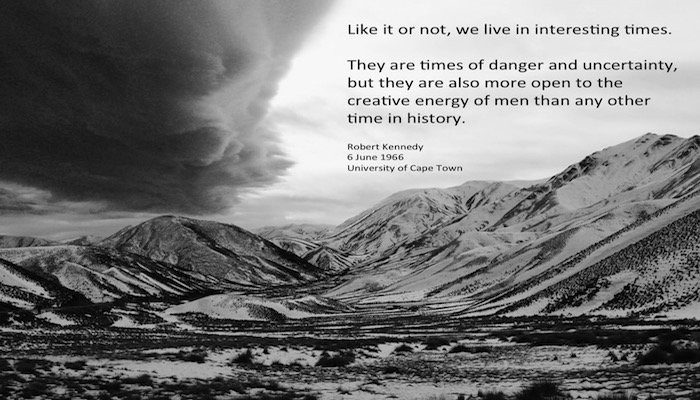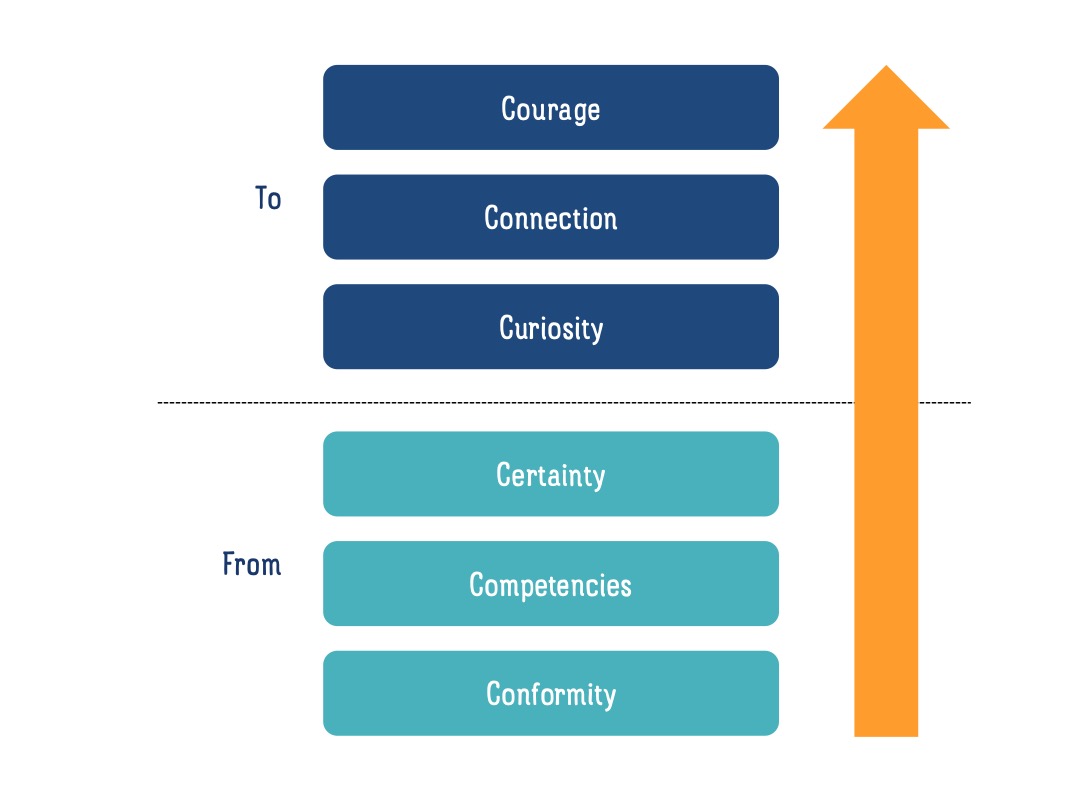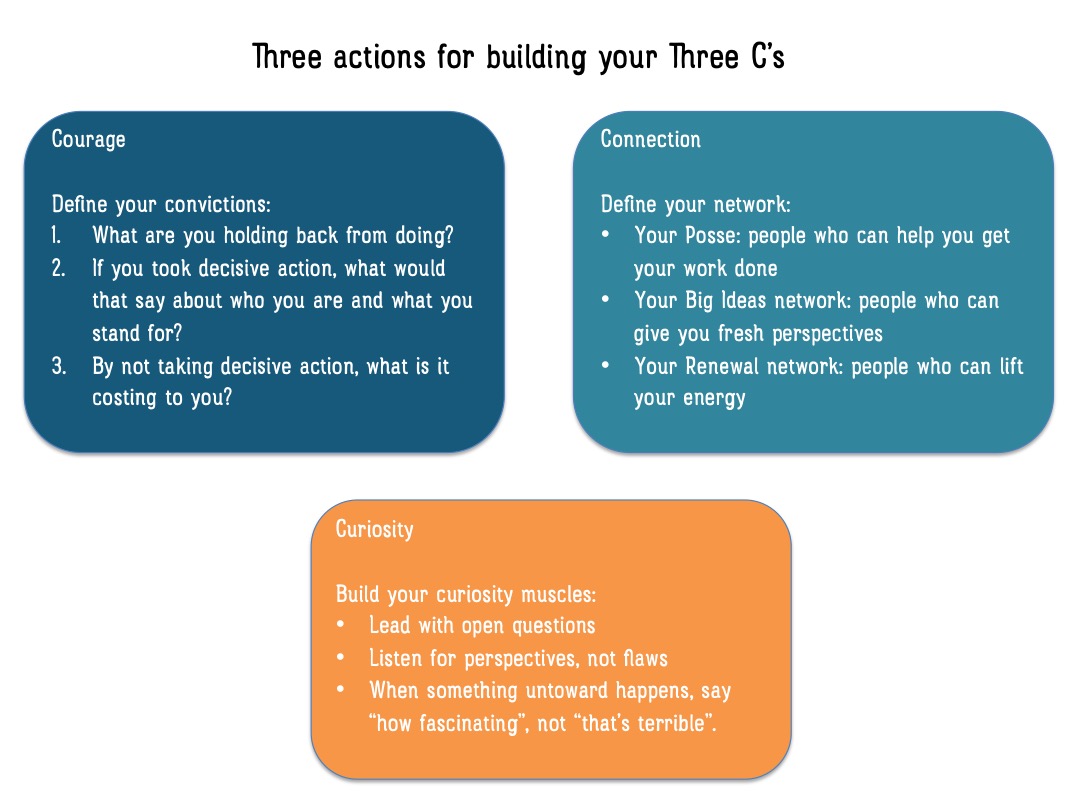
Meta-Skills For Interesting Times
23rd Aug 2016“May you live in interesting times.
May you live in an interesting age.
May you live in exciting times.”
This phrase purportedly has it’s origins in China. Over the past couple of hundred years, its popularity in the western world has tended to peak whenever the world goes into turmoil. I think it’s fair to say that we’re living through interesting times right now.
Some might say the changes and challenges we face in the world today are unprecedented. While that might be true, let’s not get too excited. Back in the day people were saying the same thing. They got through it.
And, if you think about it, the challenges YOU face in your life and times are unprecedented, at least for you. Assuming you’ve only been on the planet this one time, you’re writing your playbook as you go. That takes some doing.
Interesting times test us. They challenge our assumptions and boundaries, and ask us to invent new ways of seeing and living in the world. That goes for whether we are talking about individuals, organisations or whole societies. The work of leadership is to step up to those challenges and create a way through.
There are a few key skills that make the difference to whether we thrive or just merely survive during interesting times. Beyond the technical skills required for specific roles or situations, these are meta-skills that are fast becoming prized in organisations and communities the world over. Savvy companies, particularly in disrupted industries, are looking for, and appointing, leaders who embrace disruption, can connect across diverse demographics and cultures, and are exceptionally curious, open-minded, and courageous.
The World Economic Forum, The Institute for the Future, and futurists such as Bob Johansen have all researched and reported on the types of work skills required for 2020 and beyond. In synthesising their findings, the conclusion is that we need to shift from a world that values Conformity, Competencies and Certainty to one that embraces Curiosity, Connectedness and Courage.

These are the skills we need to cultivate in ourselves and the people who will help us to navigate these interesting times.
Courage
To act without being assured of success, without needing approval or permission, to experiment, innovate and try new approaches, be agile, and to challenge existing ideas and practices. For more on this, see my post “Do You Need Confidence, or Courage?”
Connection
The ability to seek out and connect meaningfully with a diverse range of people, apply social intelligence, serve others, and to collaborate effectively in a wide array of settings. The ability to deliberately cultivate an effective network is an essential skill in interesting times.
Curiosity
The insatiable drive to ask questions, learn, unlearn, sit with ambiguity and ‘not knowing’, to step back, critique, and make sense of things objectively, to seek and find deeper meaning in the patterns, and see things from new and different perspectives, to have novel and adaptive thinking. Leonardo Da Vinci was a master of curiosity, which helped to make him one of the most creative people the world has ever known.
What would be the value in having more of these three C’s, both in your organisation and for yourself?
While aspiring to having more of these three C’s, we also need to transcend (but not throw out) another set of C’s:
Certainty
We are wired for certainty. In fact, our brains crave it. Certainty helps us make predictions more confidently, so we can operate in the world without having to use a huge amount of mental resources for each and every activity. In interesting times, the challenge is not to get rid of the need for certainty, but instead to learn to live in paradox: to create certainty while knowing that nothing is certain (besides death and taxes).
Competencies
For a most of the latter half of the 20th century and well into the current one, the default method of thinking about development has been through the lens of competencies i.e. the behaviours and skills you demonstrate. This approach overlooks the fact that our behaviours are guided by our mindsets – the way in which we think and see the world. If we want to thrive in interesting times, we need to move beyond upgrading competencies to also upgrading our thinking. This is known as vertical development. As Einstein said “we cannot solve our problems with the same thinking we used when we created them.”
Conformity
Like certainty, conformity has its place. We need standards, norms and laws to keep things running smoothly. In interesting times, it is often these norms, and their underlying assumptions, that are being tested. Rather than uphold conformity for it’s own sake, the more useful approach is to get behind the reason for the rule, and explore its usefulness in the current context.
Making It Happen
To cultivate your own three C’s of Courage, Connection and Curiosity, start with these tips:

What Next?
If you’re interested in cultivating more Courage, Connection and Curiosity in your organisation, please get in touch for an interesting conversation to see what we can do together.
And download my latest thinking on how to future-proof your organisation by developing the three C’s in your next generation of leaders: How To Play With Fire – Equip Your Next Generation of Leaders To Deal With Anything
Like this post? You’re only getting half the story. Sign up to my ‘Fresh Thinking’ newsletter, delivered monthly to your inbox.
Are you a Change Maker? Find out when the next intake of my Change Makers programme is. Want to Learn more.


2 thoughts on “Meta-Skills For Interesting Times”
Comments are closed.